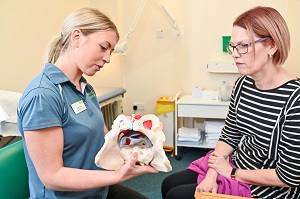The six myths of pelvic health.
Bladder, bowel and sexual health are still not topics everyone feels comfortable talking about which can lead to misinformation. Pelvic health specialist, Senior Physiotherapist Megan Campbell clarifies six of the most common myths about your pelvic floor and encourages you to see your GP or a pelvic health physiotherapist if you are experiencing any symptoms.
Myth: “It’s normal to leak urine; especially after having a baby or as I get older.”
Urinary leakage (also called urinary incontinence) occurs in up to 4 in 10 women, and 1 in 10 men. Although urinary leakage is common it should never be considered normal. There are many different treatment options available to either improve or cure urinary leakage. Seeking help early is recommended, however it is also never too late to ask for help. Some people believe that nothing can be done if they have had the problem for a long time, but this isn’t true.
Myth: “I have a small bladder and that’s why I have to go to the toilet so much.”

How often you go to the toilet to empty your bladder depends on many things such as how much you drink, the weather and your activity levels. Most commonly though people empty their bladder between 6-7 times per day, and 0-1 times per night.
Having a small bladder is rare. Often people have a normal sized bladder that is just not working at its best. It is normal to be able to hold 1-2 cups of urine comfortably in your bladder.
You should feel that have control over your bladder. If you feel you need to go to the toilet too often, or have to rush to get there you should seek advice from your GP or pelvic health physiotherapist.
Myth: “It’s normal to have to strain to empty my bowels.”
Constipation and regular straining can lead to other pelvic floor problems such as pelvic organ prolapse. If you’re having difficulty emptying your bowels, try changing your position on the toilet:
- Place your feet on a small stool so that your knees are slightly higher than your hips, and feet are apart
- Lean forward resting your elbows on your thighs and relax your tummy
- Try some relaxed deep breathing too.
Ensuring you are eating enough fibre and drinking enough fluid is also important. If you still feel constipated or regularly need to strain to empty your bowels you should see your GP or a pelvic health physiotherapist.
Myth: “It’s normal for sex to hurt.”
Sex should be enjoyable and not painful, but a study in 2017 found almost 1 in 13 women experienced pain during sex. There can be many reasons why sex may be painful such as an infection, changing hormones levels, healing tissues after childbirth, problems with the pelvic floor muscles or psychological reasons.
Whatever the cause, it is important to see your GP as some causes will require medical care. A pelvic health physiotherapist can help when the cause relates to your pelvic floor.
Myth: “Doing lots of pelvic floor squeezes will fix all of my symptoms.”
Pelvic floor muscle exercises should be individualised. Whilst some people will benefit from strengthening their pelvic floor muscles, other people need to focus more on relaxation or co-ordination.
A pelvic health physiotherapist can assess your pelvic floor and will let you know if you would benefit from performing pelvic floor muscle exercises. If so, they will teach you the correct way to do them.
Myth: “I’ve tried pelvic floor exercises in the past and they didn’t work, so there’s nothing I can do about my symptoms.”
There is more to pelvic floor exercises than just squeezing, it may be that a different exercise regime will work for you.
Pelvic floor exercises are not the only treatment option either. A pelvic health physiotherapist can also discuss behaviour and lifestyle factors, look at your breathing, posture and how your whole body works together. There are pieces of equipment that may help or sometimes a referral onto other specialists may be advised.
About Megan Campbell

Megan graduated as a physiotherapist from La Trobe University in Australia in 2011. Megan then went on to pursue her interest in Pelvic and Women’s Health, completing a Graduate Certificate in Clinical Physiotherapy at Curtin University in Australia. Megan is passionate about helping people to improve their pelvic health. Megan’s particular area of interest is treating pelvic floor dysfunction (vaginal prolapse, bladder and bowel concerns) as well as post-natal recovery.
Find out more about the Women's Health Physiotherapy at Nuffield Health Leeds Hospital
References:
Cooper J, Annappa M, Quigley A, Dracocardos D, Bondili A, Mallen C. Prevalence of female urinary incontinence and its impact on quality of life in a cluster population in the United Kingdom (UK): a community survey. Prim Health Care Res Dev. 2015 Jul;16(4):377-82. doi: 10.1017/S1463423614000371.
